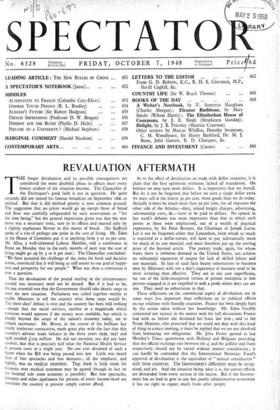REVALUATION AFTERMATH
THE longer devaluation and its possible consequences are considered the more doubtful about its effects must every honest student of the situation become. The Chancellor of That the devaluation of the pound sterling in the circumstances created was necessary need not be denied. But if it had to be, the one essential was that the Government should take drastic steps to meet the new situation. Parliament was called together mainly to enable Ministers to tell the country what those steps would be. The three days' debate is over and the country has been told nothing —except that the social services, swollen to a magnitude which everyone would approve if the money were available, but which is plainly beyond the scope of the nation's economy today, are to remain sacrosanct. Mr. &van, in the course of his brilliant but totally irrelevant coruscation, made great play with the fact that this country's adverse trade balance in the three years 1936, 1937 and 1938 totalled £129 million. He did not mention, nor did any later speaker, that that is precisely half what the National Health Service at present costs in a single year. No one ever dreamed of such a figure when the Bill was being passed into law. Little was heard then of free spectacles and free dentures ; all the emphasis, and rightly, was on medical treatment. That there is little room for economy over medical treatment may be agreed (though in fact on the hospital side some economy is possible). But free spectacles, dentures and other appliances for persons of every income-level are amenities the country at present simply cannot afford. As to the effect of devaluation on trade with dollar countries, it is plain that the first optimistic estimates lacked all foundation. On balance we may earn more dollars. It is imperative that we should. But let it not be forgotten that before we earn a single dollar extra we must sell at the lowest 3o per cent. more goods than we do today. Actually it must be much more than 3o per cent., for all expanses the other side of the Atlantic—duty, inland freight charges, advertising, salesmanship costs, &c.—have to be paid in dollars. No speech in last week's debates was more impressive than that in which such points as these were emphasised, out of a wealth of practical experience, by Sir Peter Bennett, the Chairman of Joseph Lucas. Let it not be forgotten either that Lancashire, from which so much is expected as a dollar-earner, will have to pay substantially more for much of its raw material, and must therefore put up the sterling price of the finished article. The pottery trade, again, for whose wares there is immense demand in the United States, can achieve no substantial expansion of output for lack of skilled labour and raw materials. In face of such facts hearty exhortations to business men by Ministers with not a day's experience of business tend to be more irritating than effective. They are in any case superfluous, for one of the little-recognised virtues of private enterprise is that persons engaged in it are impelled to seek a profit where they can sec one. They need no exhortation to that.
These reflections on the commercial aspect of devaluation are in some ways less important than reflections on its political effects on our relations with friendly countries. France has been deeply hurt by the action taken without her knowledge. Mr. Eden forcibly contrasted our secrecy in the matter with the lull discussions France had with us before she devalued her franc last year ; and to the Prime Minister, who protested that we could not deal with this kind of thing in a mass meeting, it must be replied that we are not absolved from honouring our obligations. Mr. John Foster quoted in last Monday's Times agreements with Holland and Belgium providing that the official exchange rate between the L and the gutldcr and franc respectively should not be varied without mutual consultation ; it can hardly be contended that the International Monetary Fund's approval of devaluation is the equivalent of " mutual consultation " with those countries. The Government's difficulties must be recog- nised, and are. And the situation being what it is, the utmost efforts are demanded from every section of the nation. But if the Govern- ment has no lead to give in any but purely administrative economics it has no right to expect much from other people.






































